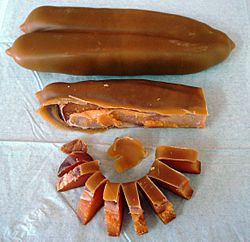Bottarga facts for kids

Whole and sliced bottarga
|
|
| Alternative names | Botarga, botargo, butàriga, and many others |
|---|---|
| Course | Hors d'oeuvre, pasta dishes |
| Main ingredients | Fish roe |
Bottarga is a special food made from salted and dried fish eggs, called roe. It usually comes from the grey mullet or the bluefin tuna. This tasty treat is most famous in countries around the Mediterranean Sea. You can find similar foods in Japan (called karasumi), Taiwan (wuyutsu), and Korea (eoran). Bottarga has many different names and is prepared in various ways depending on where you are.
Contents
What is Bottarga?
Bottarga is a type of delicacy, which means it's a rare and special food. It's made by carefully taking out the entire pouch of fish eggs. These eggs are then cleaned, salted, and left to dry. This process makes them firm and gives them a unique, salty flavor.
Where the Name Comes From
The English name bottarga comes from Italian. It's believed that the Italian word came from the Arabic word buṭarḫah. This Arabic word likely came from an older Byzantine Greek word, oiotárikhon. This Greek word was a mix of oion (meaning 'egg') and tarikhon (meaning 'pickled').
The Greek word for this food was first written down around the 11th century. A doctor named Simeon Seth even wrote that it should be "avoided totally"!
How Bottarga is Made
Bottarga is mostly made from the eggs of the grey mullet. Sometimes, it's also made from Atlantic bluefin tuna eggs.
The process involves several steps:
- First, the fish egg pouch is gently massaged by hand. This helps to remove any air bubbles inside.
- Next, it is covered in sea salt. It stays in the salt for a few weeks to dry and cure.
- After curing, it becomes a hard, dry slab.
- In some places, like Greece and Egypt, it used to be covered in beeswax. This helped to keep it fresh for a long time.
The time it takes to cure can change. It depends on the person making it and how firm they want the bottarga to be. When it's ready, bottarga is usually sliced very thin or grated. People often eat it as an appetizer or add it to pasta dishes.
Bottarga Around the World
Bottarga is popular in many countries, especially around the Mediterranean.
In Croatia
In Croatia, this food is called butarga or butarda. People often fry it before they eat it.
In Egypt
Bottarga is made in the Port Said area of Egypt. Egyptians usually call it Batarekh.
In France
The common name in France is boutargue. In a region called Provence, it's known as poutargue. It is made in the city of Martigues.
In Greece
In Greece, it's called avgotaracho. It's mainly made from mullet fish caught in Greek lagoons. The whole egg pouches are washed, salted, and dried in the sun. Then, they are sealed in melted beeswax. A special type, Avgotaracho Messolonghiou, is protected by a special European and Greek label.
In Italy
In Italy, bottarga is made from bluefin tuna in Sicily. In Sardinia, it's made from flathead mullet and called butàriga.
It's often served with olive oil or lemon juice. People eat it as an appetizer with bread or small toasted slices of bread called crostini. It's also a popular ingredient in pasta dishes. Bottarga is considered a traditional Italian food product.
In Spain
In Spain, bottarga is mostly made and eaten in the southeastern parts of the country. This includes the Murcia region and the province of Alicante. It can be made from the eggs of different fish, like grey mullet, tuna, or bonito. Much of it is made near the town of San Pedro del Pinatar.
In the United States
There are several places that make bottarga in Florida. Old records from the 1500s show that Native Americans in Florida were already eating dried mullet roe when European explorers arrived.
Images for kids
See also
 In Spanish: Botarga (alimento) para niños
In Spanish: Botarga (alimento) para niños
 | William Lucy |
 | Charles Hayes |
 | Cleveland Robinson |



